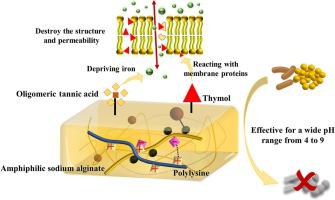Carbohydrate Polymers ( IF 10.7 ) Pub Date : 2022-10-05 , DOI: 10.1016/j.carbpol.2022.120195 Fangyu Jin 1 , Shiqin Liao 2 , Wei Li 1 , Chenyu Jiang 3 , Qufu Wei 1 , Xin Xia 4 , Qingqing Wang 5

|
Bacterial infection is a major pathological factor leading to persistent wounds. With the aging of population, wound infection has gradually become a global health-issue. The wound site environment is complicated, and the pH changes dynamically during healing. Therefore, there is an urgent need for new antibacterial materials that can adapt to a wide pH range. To achieve this goal, we developed a thymol-oligomeric tannic acid/amphiphilic sodium alginate-polylysine hydrogel film, which exhibited excellent antibacterial efficacy in the pH range from 4 to 9, achieving the highest achievable 99.993 % (4.2 log units) and 99.62 % (2.4 log units) against Gram-positive Staphylococcus aureus and Gram-negative Escherichia coli, respectively. The hydrogel films exhibited excellent cytocompatibility, suggesting that the materials are promising as a novel wound healing material without the concern of biosafety.
中文翻译:

在宽 pH 范围内具有高抗菌效率的两亲性海藻酸钠-聚赖氨酸水凝胶
细菌感染是导致伤口持续存在的主要病理因素。随着人口老龄化,伤口感染逐渐成为全球性的健康问题。伤口部位环境复杂,愈合过程中pH值动态变化。因此,迫切需要能够适应较宽pH范围的新型抗菌材料。为实现这一目标,我们开发了一种百里酚-低聚单宁酸/两亲性海藻酸钠-聚赖氨酸水凝胶薄膜,在 4 至 9 的 pH 范围内表现出出色的抗菌功效,最高可达到 99.993%(4.2 log 单位)和 99.62% (2.4 对数单位)对抗革兰氏阳性金黄色葡萄球菌和革兰氏阴性大肠杆菌, 分别。水凝胶薄膜表现出优异的细胞相容性,表明该材料有望成为一种无需担心生物安全性的新型伤口愈合材料。






























 京公网安备 11010802027423号
京公网安备 11010802027423号